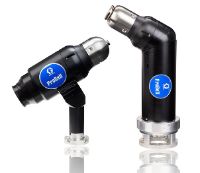4 Signs Your Rotary Bell Needs Help
If you answer “yes” to any of these questions, it’s time to repair or replace a bell applicator on your paint line.
A Properly Working Bell Means More Material Savings
Rotary bell atomizers – a.k.a. bell applicators or paint bells – started transforming industrial finishing more than two decades ago. Known for transfer efficiency rates of up to 95 percent, they’ve cut costs and improved quality for high volume paint operations worldwide.
Most bell applicators currently in use are 10 to 15 years old. While it’s likely they still have a lot of life left in them, subtle changes in their performance affect quality and efficiency.
If you answer “yes” to any of these questions about a rotary bell atomizer on your paint line, it might be time to repair or replace it:
Is the touchup booth busy?
Your bell atomizer should deliver a fine, even spray. With electrostatics, the spray should wrap around the part, evenly coating all angles and crevices.

A worn-out applicator produces uneven or reduced paint spray that does not completely wrap around the part. When that happens, more and more manual touchups are needed so that the finish meets quality standards.
Are paint booth filters being changed too often?
As a rotary bell applicator’s performance declines, so does transfer efficiency. That means less paint spray gets to the part, and more overspray ends up in the booth filter.
After how many hours of use does your paint booth manufacturer or filter supplier say the filters should be changed? If the actual frequency of booth filter changes is more than what’s recommended, it may be due to overspray from a slowly failing bell.
Manometer readings are another measure to watch. Most paint booths have a manometer mounted in the back, near the filter bank. On a correctly calibrated manometer, a reading of 0.5 to 1.0 inch above zero means that buildup in the filters is causing pressure to increase. In other words, the paint booth filter is clogged and needs to be replaced.

Are you waiting for parts or service?
Regular maintenance and repair keeps industrial equipment up and running. But when new technology emerges, parts to keep the old tech running get harder to come by.
Production of repair parts for older rotary bell atomizers may be discontinued or decreased as equipment manufacturers service their latest models.
Even if you think your paint bell works well enough with a little service, you may need to weigh the costs of poor performance or downtime while waiting for parts, against upgrading to a newer model with quick part availability and service.
Are the electrostatics losing charge?
Bell applicator parts tend to be more durable than the high-voltage cables that connect the paint bell to electrostatics.
If a damaged cable is affecting electrostatics, the paint booth’s system logic controller should display reduced voltage or efficiency. The problem also would become noticeable as the lack of electrostatics causes paint spray to no longer wrap completely around a part.
Ask your distributor about the safest way to test the power supply cable that runs from the electrostatic controller to the spray gun.
Service Tips for ProBell Rotary Applicators
Learn how a rotary bell applicator works and get troubleshooting tips. See the 30-minute webinar on-demand.
CONTACT AN EXPERT
Related Articles
Applicator Technology
When choosing the right liquid spray technology, it helps to understand the differences between air spray, air assist, electrostatic and rotary bell applicators.
Take the Paint Efficiency Audit
Take the paint efficiency audit and assess your current equipment and processes.
3 Steps to Reduce VOCs in Paint Lines
To minimize VOCs, manufacturing companies are looking for ways to reduce paint and solvent waste with more efficient equipment and automated processes.




